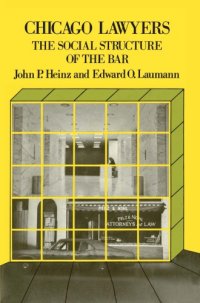
Ebook: Chicago Lawyers: The Social Structure of the Bar
Author: John P. Heinz Edward O. Laumann
- Tags: Ethics & Professional Responsibility, Law, Legal Profession, Legal Education, Law, Specific Demographics, African-American Studies, Asian American Studies, Disabled, Ethnic Studies, Gay & Lesbian, Hispanic American Studies, Minority Studies, Native American Studies, Social Sciences, Politics & Social Sciences, Law, Business Law, Constitutional Law, Criminal Law, Legal Reference, Tax Law, New Used & Rental Textbooks, Specialty Boutique, Social Sciences, Anthropology, Archaeology, Criminology, Gay & Lesbian Studies, Gender S
- Year: 1982
- Publisher: Russell Sage Foundation
- Edition: 1st
- Language: English
- pdf
As Heinz and Laumann convincingly demonstrate, the legal profession is stratified primarily by the character of the clients served, not by the type of legal service rendered. In fact, the distinction between corporate and individual clients divides the bar into two remarkably separate hemispheres. Using data from extensive personal interviews with nearly 800 Chicago lawyers, the authors show that lawyers who serve one type of client seldom serve the other. Furthermore, lawyers’ political, ethno-religious, and social ties are very likely to correspond to those of their client types. Greater deference is consistently shown to corporate lawyers, who seem to acquire power by association with their powerful clients.
Heinz and Laumann also discover that these two “hemispheres” of the legal profession are not effectively integrated by intraprofessional organizations such as the bar, courts, or law schools. The fact that the bar is structured primarily along extraprofessional lines raises intriguing questions about the law and the nature of professionalism, questions addressed in a provocative and far-ranging final chapter.
This volume, published jointly with the American Bar Foundation, offers a uniquely sophisticated and comprehensive analysis of lawyers’ professional lives. It will be of exceptional importance to sociologists and others interested in the legal profession, in the general study of professions, and in social stratification and the distribution of power.